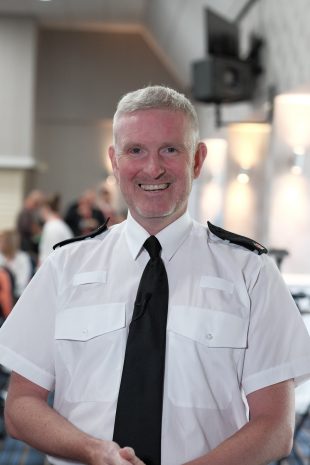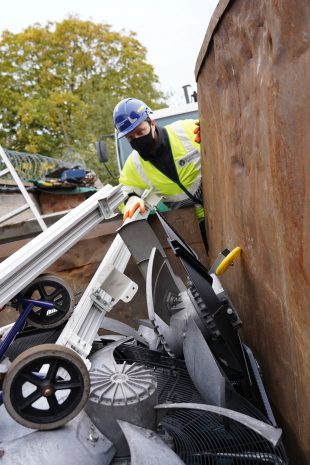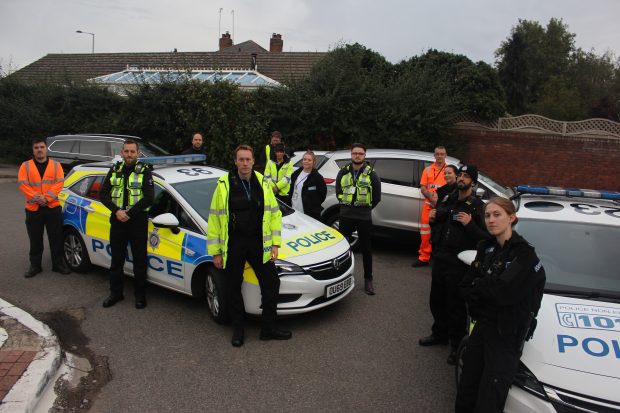As we celebrate the 1st anniversary of the Joint Unit for Waste Crime, Mark Cleland from the British Transport Police discusses how the multi-agency taskforce is tackling illegal waste activity and metal theft.
2020 was the year we tried new things; pyjama meetings, bribing children and pets to be quiet during video conferences, and silently judging peoples décor and home grooming attempts.
While we all found our way through the challenges of home working, a subtle evolution with a dramatic impact was quietly taking place in the exciting world of metal and waste crime in partnership with the Joint Unit for Waste Crime (JUWC); a partnership that has led to intelligence sharing, proactive operations and the disruption of criminality in the waste industry. ‘How is this exciting?’ I hear you question. Let me explain.
Metal theft impacts our everyday lives, disrupting railways, leaving towns without power, church roofs stripped and cars targeted for their catalytic converters. Against a backdrop of financial uncertainty and the rising price of metal, the result can be an increase in the level of acquisitive crime.
At its peak in 2013, it was estimated metal theft cost the economy £220m a year. But the social impact and cost to industry associated to metal theft increases substantially, as businesses are responsible for repairing any damage and replacing stolen goods, as well as reimbursing customers for reduced services.
We previously talked about the issue of ‘metal theft’, but that didn’t quite reflect the disruption associated with the crime. Instead, we now refer to ‘metal crime’ to highlight the theft not as an isolated incident, but as something which causes huge knock on effects and is often linked to other offending.

The quiet evolution
Knowledge and expertise had disappeared over the years after the spotlight shifted from metal crime following its peak in 2013. We found ourselves having to almost rebuild from scratch.
So, we gathered our key partners such as the JUWC and began a quiet evolution to begin to understand the true scale of the crime and the extent of links to other offending.
We found subject matter experts that could deliver training to partners and help to improve our collective knowledge. We created a hub of information to share best practice, creating a go to space for organisational learning to protect that expertise for future generations.
We built links with the JUWC and Opal, the national intelligence unit, to ensure that waste and acquisitive crime intelligence could be developed and actioned. And most importantly, we formed a metal and waste crime partnership with all UK police forces and enforcement agencies to drive activity on the ground.
Getting results through partnerships
This culminated in a week of action to tackle metal and waste crime in October led by Police UK and the JUWC, which resulted in over a thousand vehicles stopped, more than 500 visits to scrap metal dealers, vehicle dismantlers and illegal waste sites, numerous arrests and plenty of stolen property recovered.
Last year also saw the formation of a National Infrastructure Crime Reduction Partnership, bringing together the sectors typically affected to develop a range of tools that will improve how we jointly tackle crime.
These include working with SmartWater Group and their Centre for Infrastructure and Asset Protection (CIAP) to create a national database for the metal industry, a national infrastructure crime and intel mapping system, along with a partnership approach to sharing data and intelligence to reduce crime.

National infrastructure and JUWC partners can now see where crime is happening across the UK, not just for their organisation. The tools allow organisations to analyse the details and put measures in place to prevent crime happening in their industry, with an alert system available to warn organisations of developing crime patterns ahead of any attack on the national infrastructure. CIAP has also created a Red, Amber, Green rating indicator to assess scrap metal dealers, mobile collectors, illegal waste sites and vehicle dismantlers.
Not only have we created a culture of sharing data and intelligence, but we are also producing some innovative products that can help everyone.
So, is metal crime exciting? Our work is keeping the country running. It’s helping professionals do their job and it’s keeping the vulnerable safe. So I think it is exciting and we’ve achieved this with little money and resource, just people with a can do attitude who are passionate about doing the right thing.
I’ve always believed that evil endures when good people fail to act, and as a child of the 70’s who loves nothing better than a good Star Wars quote, I will simply say our attitude is: ‘Do or Do not, there is no try’. It’s all about the journey, not the destination and if you like what you see then come and help us out and be part of something amazing.
Further information
Read more about the Joint Unit for Waste Crime here.


Leave a comment